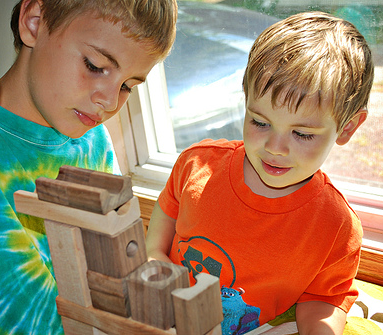For children growing up in today’s interconnected, fast-moving world, its important to be able to embrace change. Flexibility is the thinking skill that focuses on a child’s ability to adapt to new situations, improvise, and shift strategies to meet different types of challenges. So, its a good idea for parents to help their children understand the applications of this skill by using some simple, fun activities for developing kids’ flexibility skills.
Flexibility is an important skill for academics, particularly when learning complex material in which making mistakes and trial-and-error learning may be the best way to achieve mastery. But, flexibility is not only an important skill for academic success. From dealing with disappointments, to shifting expectations, and managing unexpected changes in events and routines, Flexibility skills are vital to a healthy social and family life, as well.
Tips for Developing Kids’ Flexibility Skills
1.) Come up with unconventional uses for household items. Encourage thinking about things differently. For example, discuss the different ways to use a phone book, such as for a booster seat, a doorstop, or a fire starter. Turn pots and pans into a drum set, or make a fort out of the couch and pillows. Activities like this help kids learn to look at things differently and come up with creative solutions to problems.
2.) Practice trial-and-error learning. Do something with your child for which it is clear that there is no right or wrong answer. For example, rearrange the books on a bookshelf to see how they look best, put together a flower arrangement, or try various recipes for a smoothie or an ice cream shake. Logic puzzles such as Sudoku can help in this regard, as well.
[cjphs_content_placeholder id=”73538″ random=”no” ]3.) Make up a new game. Invent new games by slightly changing the rules, or by taking rules from one game and adding them to another. Changing the rules in a game can be very difficult for children who are inflexible. For these children, it is important to play or create games in which rules do change frequently. For example, play a memory game in which players must match opposite images, rather than ones that are alike. Play a basketball “shooting” game in which players get 2, 3, 4, or 5 points depending on the type of shot that is taken. You can even create some absurd challenges, like play horseshoes with a soccer ball, or trying to play baseball using a kickball and no gloves. You can even add a timed element to one of your child’s favorite games, changing the strategies needed to win. After playing, make sure to discuss with your child how he needed to apply different strategies as the rules changed.
4.) Play games that operate strictly by chance. These include flipping coins, playing “war” with a deck of cards, or playing any number of board games that do not rely on skill, such as Candy Land or Chutes and Ladders.
5.) Demonstrate adaptive thinking through video games. Many games involve strategies that require Flexibility in response to constantly changing gameplay, unique obstacles and puzzles, and a challenges that shift level to level. Stand-out examples include Portal 2, Pivvot and Super Hexagon.






please we want more fun activities of flexibility for childrens
Thank you for the post, I enjoyed thinking about how we have got stuck in a rut with how we do things at home – we are creatures of habit. However changing things up a bit can inject a sense of fun and excitement. We are planning a new game already and the pots and pans have never sounded so good!
this didnt help at all i want a fun game that you play outside
We suggest outdoor games (and making up your own game), see #3. We also recommend trying Pokémon GO! We’ve written a lot about the game, and even have a Playbook that details how the game exercises flexibility.